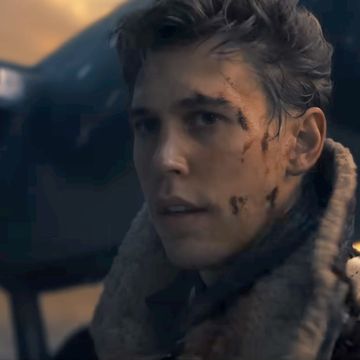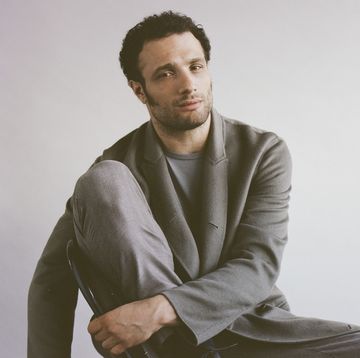An eventual fugitive of the United States government, who helped expose the sprawling tentacles of a supremely powerful surveillance and military apparatus now trained firmly on him, invites a filmmaker to document his every move. Is it Edward Snowden? Well, yes. But it's also Julian Assange, the Wikileaks founder who first allowed Laura Poitras to document his life in the digital—and at times physical—underworld beginning in 2011. Despite that, the director's Oscar-winning film on Snowden, Citizenfour, was released two years before Risk, a six-year portrait of Assange—in theaters today and premiering on Showtime this summer. Perhaps that delay was because of the more complicated task of communicating Assange's humanity to the world—which is in part what he invited Poitras into his life to do. After all, like Snowden, Assange knew that his freedom and his legacy were both tied to his ability to retain that humanity as the full weight of the worldwide political and media juggernaut crashed down upon him.
There are moments when that humanity is on full display. In one scene, Poitras captures Assange strolling slowly towards the ocean, absorbing the sun and the breeze on a rocky beach. In more troubled times, he squats in the woods near his rural English house with a lawyer from Wikileaks, periodically stopping her account of a run-in with authorities at the airport to swivel his head and glance around wildly at the slightest sound. It's a survival instinct that pops up repeatedly, but never more so than when he provides a distillation of his philosophy early on in the film.
"People who live by their principles don't last very long," he said. He readily admitted that he had an impulse to be "ruthlessly pragmatic" in order to survive.
It's an instinct not always mirrored in another of his familiar human traits: a thinly veiled taste for fame. There are times when, like Snowden, Assange fancies himself as a character that walked straight out of the pages of a John Le Carre novel: when he is fixing an intricate disguise before rushing to the Ecuadorian embassy, knowing a British court has rejected his appeal against a Swedish extradition request; and when he leaves court after an earlier hearing, captured brilliantly for the film from a vantage point high above, as he's swarmed by photographers literally falling over each other, striding gently in a full suit and black sunglasses with a beautiful woman beside him.
At times, though, Assange seems more like a machine. When Poitras asks him about his motivation for his work, he explains he simply has expertise in the area which, at this particular point in history, happens to be where everything is happening. It could be modesty, but it almost seems like for him it was no choice at all—he's merely a cog in a machine, a program performing his function within a kind of geopolitical operating system. But when I asked Poitras, she disagreed.
"Julian says in the Lady Gaga interview that he's obsessed with our political struggle," she said in the Tribeca office where we met. "I think he is, and he's put his freedom on the line for it. I think both [Assange and Snowden] are motivated to risk personal freedom, safety, et cetera, for a larger goal."
That Lady Gaga interview features in the film, and it's a remarkable scene. From a detached perspective across the room, the weird performed intimacy of the encounter is fully exposed. Gaga, leaning back in her chair in a trademark getup fit for Halloween and holding a handheld camera that zooms in close to Assange's face, peppers him with questions about the man beneath his surface. She had encouraged him to wear a stained white undershirt rather than a suit—"like a fucking rebel"—to drive home the personal nature of things. But in the moment, he is reflexively closed off.
"Let's not pretend for a moment I'm a normal person," he said, after heading off on a tangent about Malaysia in response to Gaga's request for his favorite food. "Do you ever feel like just fucking crying—even when you're happy?" she asked later. "Why does it matter how I feel?" he responded. At times, this detachment—this coded coldness—manifests in darker ways. When he is accused by two women in Sweden, his former home, of sexual misconduct, he openly imagines how much easier it would be if it were just one woman—how her credibility could be undermined, her reputation tarnished, how the whole thing might go away so he could get back to his work. It is a marriage of his survivalist's instinct and reflexive detachment. In a separate meeting with his lawyer, he explains, quite simply, that the matter is a radical feminist conspiracy against him.
Of course, these are all varying side-effects of Assange's enduring humanity. He is human, and like most of us, he struggles at times—refuses even—to acknowledge the choices he's made. Jacob Appelbaum, perhaps the film's deuteragonist and a key player at the anonymous web browsing platform Tor, says he defends his program—which shields anyone, without regard to identity or motive—with a metaphor: Do you blame the road when terrorists use it? Or is it merely a tool to be used, without intrinsic moral value? That is the question, twisted slightly, that should face Assange with Wikileaks: Is the platform he has chosen to construct merely an avenue for information to travel to those who deserve to see it? Or did he, at some point, start walking the road—or at least try to change where it leads?
After all, Risk initially premiered at Cannes in May 2016, but, as Poitras told me, subsequent events convinced her to "walk away from the film or grapple with them." That includes Appelbaum's ouster from Tor amid a raft of allegations of sexual harassment and misconduct. (Appelbaum has not been charged, and like Assange, he denies the allegations.) But it also includes the fact that, during the 2016 campaign, Wikileaks had published a huge number of documents hacked from the servers of the Democratic National Committee and Hillary Clinton campaign chair John Podesta, which U.S. intelligence later traced to Guccifer 2.0, a hacker whom they claimed was affiliated with Russian intelligence.
In our interview, Poitras was adamant that Assange's motives and mandate had not changed. "Julian's super consistent in terms of what his goals are," she said. "He believes that information from governments or corporations that impact citizens should be public." She said the information in the leaks was newsworthy, and that any news organization would've published them—which they quickly did after Wikileaks. She added that any argument that Wikileaks only published information about one side is based on the unfounded presumption that Assange had RNC emails, or Donald Trump's tax returns, and chose not to publish. But she did leave the door open to the idea that this new era of anonymous sourcing—which led her to Edward Snowden but also, according to U.S. intelligence, led Assange to Guccifer 2.0—presents new problems.
"Sources always have agendas," she said. "It raises new kinds of questions for journalists." Is Assange a journalist? He certainly controls a particular road, and in this instance, he chose to let a source with a fairly clear agenda walk all over it. Whether he's fully aware of the choice he made—or if he is and is merely hiding behind a philosophy of fundamentalist information freedom, or if the road really is just a road—is not exactly clear. Did that "ruthless pragmatism" come into play? The subterranean Internet—a digital world of vigilantes, freedom fighters, anti-government activists, and other shadowy actors who operate beyond states and governments—is nothing if not murky.
That's the world of petrifying uncertainty Poitras found herself in when she chose to link up with Edward Snowden in a Hong Kong hotel. Her body of work before and after landed her on government watchlists, and more than once she's been detained for hours without stated cause at John F. Kennedy International Airport. She was launched—or launched herself—into the crucible of history with her films, a point perfectly demonstrated when, at one point while following Assange in Risk, she's contacted by an anonymous source. At first, she assumed it was an FBI attempt at entrapment—and hid it from Assange. (In our interview, she suggested it was to protect him. But in the film, she says out right that she no longer trusted him.) Soon, though, she took the leap and met Snowden and Glenn Greenwald in Hong Kong. But one choice presented too much risk.
"There were choices that Julian made that were too risky for me," she said, "When he—and particularly Sarah [Harrison of Wikileaks]—came forward to secure asylum for Ed [Snowden], that was a line. I was worried about the consequences for me. They chose to cross, to their credit."
Say what you will about Assange—he's got a high tolerance for risk. He is not afraid to make a choice, and he is constantly calculating the consequences. The question is: Does he always calculate the consequences for people not named Julian Assange?














